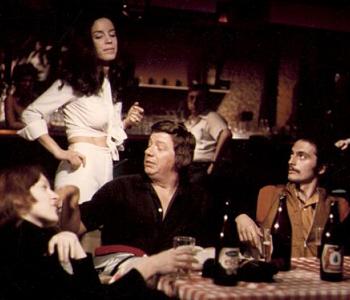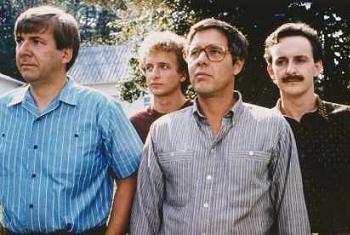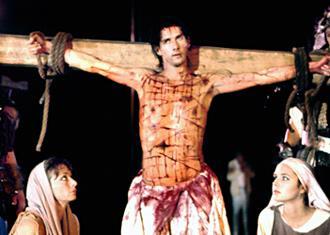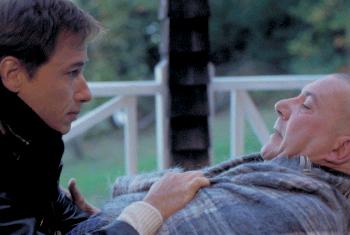1970
On est au coton 77
[ A prime example of cinema direct, this first feature documentary by Denys Arcand achieved mythical status because of how it was censored for more than 30 years by the National Film Board of Canada. Only recently has the full, uncut version been made available, and it reveals itself to be a bit ahead of its time, kinda like a Michael Moore movie done long before Michael Moore came around with his “Roger & Me” (just look at the classic bit where a smirking Arcand deals with a cop!). Ostensibly about the textile industry, “On est au coton” digs deeper and gives us an overview of the dark side of capitalism in general, of the pains of the working class and of the resilience (or resignation?) of poor French Canadians. The stark B&W footage shot inside factories and the deafening ambient sound that comes with it convey effectively the alienating nature of work in these places, but Arcand goes beyond this impressionistic approach to also give the people a chance to express themselves, which gives the film a humanist quality. Cleverly cross-cutting between the interviews with the company president and the workers, the movie also touches upon the union battles that have been waged and the way politics play into all this. At nearly three hours in length, it gives us a lot to process in one viewing, but it’s worth the effot. ]1972
Québec: Duplessis et après… 72
[ This documentary quite interestingly attempts to prove that, in covering the 1970 Québec election, one can catch glimpses of the same traits put forward by the infamous Duplessis during the 20-some years he spent as Prime Minister. The film also uses excerpts from the Durham report to illustrate how things have or haven’t changed over the years. But beside those clever gimmicks, this is most fascinating for the chance to see vintage footage (speeches, interviews, etc.) of great old-school politicians like Bernard Landry, Claude Charron and René Lévesque, back when they were actually very much new-school. And then there are all those other candidates who are either terminally dull (Robert Bourassa) or ridiculously over the top (Camil Samson). ]La maudite galette
1973
Réjeanne Padovani 64
[ A dark, leisurely paced portrait of politicians hobnobbing with gangsters on the eve of the inauguration of a new highway, this early Arcand film seems to be somewhat influenced by “The Godfather” stylistically, while content-wise, it exposes a lot of the dirty secrets about Quebec high society that the director discovered during his documentary making years. It’s all quite fascinating, even though the film can be a bit too dry. ]

1975
Gina 78
[ It’s quite sly how Arcand made both a film about the making-of of his controversial documentary “On est au coton” and the Québec version of a 1970s exploitation flick, with sex, violence… and snowmobiles! Set in Louiseville, where Gabriel Arcand, Serge Thériault and their crew are shooting a movie about the textile industry, it also revolves around the title character, a stripper played by Céline Lomez who befriends the filmmakers and ends up getting into trouble with a snowmobile gang led by Claude Blanchard. This leads to a surprisingly badass and well-crafted climax, which is practically on the level of something Tarantino would have made, or at least something he would enjoy watching in an old, gritty B-movie. ]
1982
Le Confort et l’indiférence 85
[ What a tragedy… Using the teachings of Machiavelli as a framing device, this documentary depicts the failed 1980 referendum that could have made Québec independent, if it wasn’t for the Canadian political and capitalist elites’ shenanigans and, to be honest, the fact that so many of us are Elvis Gratton-style idiots. I’m not sure if that was his intention or not, but Arcand shows that that’s the main reason why we’ll never have a country: people’s stupidity, laziness, apathy, greed, cowardice… I mean, damn, how could you listen to a great man like René Lévesque, whose speeches (as sampled here) were so intelligent and heartfelt, and not want Québec to be a sovereign nation? Especially when his counterparts (Trudeau, Chrétien, Ryan, Samson, etc.) are so obviously full of shit? A tragedy, I tell ya… ]
1984
Le Crime d’Ovide Plouffe

1986
Le Déclin de l’empire américain 43
[ The film opens with a university teacher telling his students that History is all about numbers, i.e. South Africans can overcome yet African-Americans never will. “History is not a moral science.” Interesting. Then we have the Head of the History Department talking to a reporter about how “the expectation of receiving instant gratification in daily life constitutes the normative parameter of existence.” Bleh, not so interesting anymore. This is a pretentious filmmaker setting loose pretentious characters to make pretentious audiences nod in recognition, “Aren’t we sophisticated and erudite?” But the filmmaker/characters don’t want to seem pretentious, of course, so they start talking about and having sex. And there’s your “Déclin”, a wildly overrated film alternating a few actual insights with a lot of tedious intellectual grandstanding and genitals-gazing. ]

1989
Jésus de Montréal 90
[ A modern retelling of the Passion of Christ, with Lothaire Bluteau as a local actor who plays Jesus in a live play being staged on Mont-Royal and ends up sharing his character’s fate. Both a wickedly funny satire aimed at the media and organized religion and a moving spiritual journey, this is writer-director Arcand at his most effective. ]
1993
Love & Humain Remains

2000
Stardom 37
[ This satire of our media-addicted society and of the cult of youth and beauty is notable for its clever use of various film and TV styles to tell the story of a hockey player turned model turned trophy wife (played by the astonishingly gorgeous Jessica Paré) but, quite ironically, it’s generally as superficial and inconsequential as its subject. ]

2003
Les Invasions barbares 88
[ review ]

2007
L’Âge des ténèbres 0
“J’me suis dit, je l’fais, d’la marde.”
– Denys Arcand, after the FNC screening, candidly
explaining that he had a feeling this movie
wouldn’t work but decided to make it anyway.
Oh, of course I’d been aware of the noxious buzz coming off this movie over the last six months, as it’s been befuddling critics in Cannes, in Toronto and in France. But damn! One of the things I hate the most about critics is groupthink: when everyone is hating on a movie, it usually turns out that it’s not so bad. That’s what I thought here, as I was reading about how this was a “film de vieux con” and “le film de trop d’un auteur claquemuré dans une rancoeur stérile”. It couldn’t be that bad, right? WRONG! It’s worse. So, so much worse. It’s not only the worst movie Denys Arcand’s ever made (“Stardom” is genius in comparison), it might be the worst movie any world-class filmmaker has ever made. I mean, I don’t like everything Ang Lee or Gus Van Sant make, but you’re always guaranteed a minimum of interesting artistic input. Here, at best, Arcand is feebly rehashing his own work.
Otherwise, “L’âge des ténèbres” is filled with the most obvious, aimless, unfunny satire, not to mention endless ranting, idiotic skits and pointless cameos from Québécois or French stars (amongst those embarrassing themselves here: Thierry Ardisson, Bernard Pivot, Véronique Cloutier, Chantal Lacroix, Gaston Lepage, Michel Rivard & Marie-Michèle Desrosiers, Pauline Martin, Christian Bégin, my man Mathieu Baron). In bigger parts, Sylvie Léonard and Caroline Néron are also atrocious, and Arcand manages the impossible feat of making the usually wonderful Marc Labrèche (who’s the star of this witless rip-off of “American Beauty”) dull. His character is intended to be boring, I know, but even his dreams are a bore!
As you may know, it’s been suggested that this is the last in a thematic trilogy which started with “Le déclin de l’empire américain”, which I also dislike, but nowhere near as much. That first movie in Arcand’s Bourgeois Baby Boomer trilogy showed BBBs at their “peak”, observing the decline of civilization around them but remaining smug and enjoying the smell of their own farts. I actually love the middle film in this triptych, “Les invasions barbares”, maybe because it’s more human, less self-content, as if the BBBs had realized the err of their ways and were now trying to be open-minded towards the younger generation. Alas, that didn’t last. In “L’âge des ténèbres”, that open mind is slammed shut and chooses to reject post-BBB society wholesale, with infinite bitterness, pessimism and contempt. Thanks, but no thanks. ]
